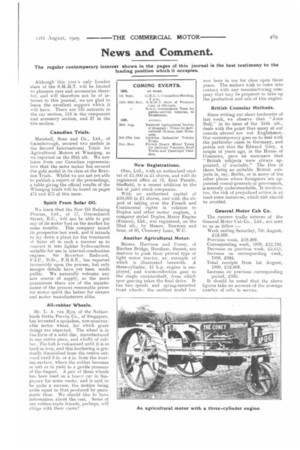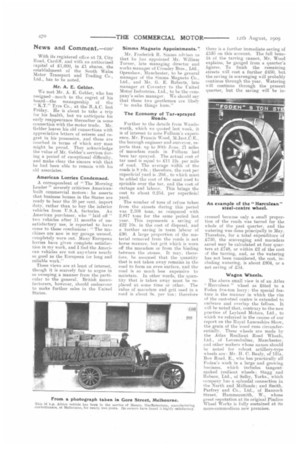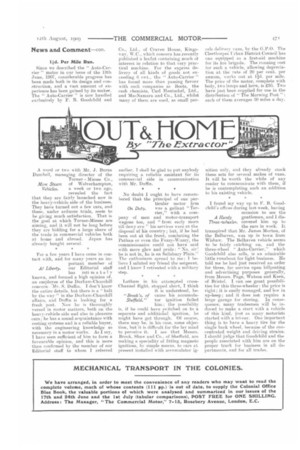News and Comment.
Page 7

Page 8

Page 9

If you've noticed an error in this article please click here to report it so we can fix it.
The regular contemporary interest shown in the pages of this journal is the best testimony to the leading position which it occupies.
Although this year's only London show of the S.M.M.T. will be limited to pleasure cars and accessories therefor, and will therefore not be of interest to this journal, we are glad to learn the excellent support which it will have. There are 135 entrants in the car section, 118 in the component and accessory section, and 27 in the tire section.
Canadian Trials.
Marshall, Sons and Co., Ltd., of Gainsborough, secured two medals in the Second International Trials for Agricultural Motors at Winnipeg, as we reported on the 29th ult. We now learn from our Canadian representative that the same maker has secured the gold medal in its class at the Brandon Trials. Whilst we are not yet able to publish a report of the proceedings, a table giving the official results of the Winnipeg trials will be found on pages 474 and 475 of this issue.
Spirit From Solar Oil.
We learn that the New Oil Refining Process, Ltd., of 17, Gracechurch Street, E.C., will not be able to put any of its motor fuel on the market for some months. This company issued its prospectus last week, and it intends to lay down a plant for the treatment of Solar oil in such a manner as to convert it into lighter hydro-carbons suitable for use in internal-combustion engines. Sir Boverton Redwood, D.Sc_, F.R.S.E., has reported favourably upon the process, but only meagre details have yet been made public. We naturally welcome any new source of supply, as the more guarantees there are of the maintenance of the present reasonable prices for motor spirit the better for owners and motor manufacturers alike.
All-rubber Wheels.
Mr. L. A. van Ryn, of the Netherlands Gutta Perelia Co., of Singapore, has invented a epokeless, non-puncturable motor wheel, for which great things are expected. The wheel is in the form of a solid disc, manufactured in one entire piece, and wholly of rubber. The hub is vulcanized until it is as hard as iron, and this hardening is gradually diminished from the centre outward until 3 in. or 4 in. from the wearing surface, where the rubber becomes so soft as to yield to a gentle pressure of the fingers. A pair of these wheels has been used On a heavy car in Singapore for some weeks, and is said to be quite a success, the motion being quite equal to that produced by pneumatic tires. We should like to have information about the cost. Some of our rubber-trade friends, perhaps, will oblige with their views ? New Registrations.
Oleo, Ltd., with an authorized capital of 41,000 in 41 shares, and with its registered office at 12, East Parade, Sheffield, is a recent addition to the list of joint stock companies.
With an authorized capital of 450,000 in 41 shares, and with the object of taking over the French and Continental rights in relation to Duplex and other motor engines, a company styled Duplex Motor Engine (France), Ltd., was registered, on the 22nd ult., by Messrs. Newman and Sons, of 66, Chancery Lane, W.C.
Another Agricultural Motor.
Messrs. Harrison and Coney, of Birchen Bridge, Horsham, Sussex, are desirous to push their proved type of light motor tractor, an example of which is illustrated herewith. A three-cylinder, 13 h.p. engine is employed, and worm-reduction gear to the single countershaft, from which spur gearing takes the final drive. It has two speeds and spring-mounted front wheels ; the earliest model has now been in use for close upon three years. The makers wish to come into contact with any manufacturing company that may be prepared to take up the production and sale of this engine.
British Consular Methods.
Since writing our short leaderette of
last week, we observe that John Bull," in its issue of the 24th ult., deals with the point that many of our consuls abroad are not Englishmen. Our contemporary goes on to deal with the particular cases in Germany, and points out that Sir Edward Grey, a couple of years ago, in the House of Commons, gave an assurance that "British subjects were always appointed, if available." The idea of there being no suitable British eubjects in, say, Berlin' or in many of the other places where foreigners are appointed consul-generals or pro-consuls, is scarcely understandable. It involves, too, the risk of prejudiced action in at least some instances, which risk should be avoided.
General Motor Cab Co.
The current traffic returns of the General Motor Cab Co., Ltd., are sent to us as follow :— Week ending Saturday, 7th August, £13,668.
Previous week, 4.18,309.
Corresponding week, 1908, 412,734. Decrease on previous week, 44,641. Increase on corresponding week, 1903, 4934.
Total receipts from 1st August, 1909, 413,668.
Increase on previous corresponding period, 4934.
It should be noted -that the above figures take no account of the average number of cabs in service. With its registered office at 73, City Road, Cardiff, and with an authorized capital of £1,000, in £1 shares, the establishment of the South Wales Motor Transport and Trading Co., Ltd., has to be noted.
Mr. A. E. Gelder.
We met Mr. A. E. Gelder, who has resigned—much to the regret of his hoard--the managership of the " K.T." Tyre Co., at the R.A.C. last Friday. He is about to take a trip for his health, but we anticipate his early reappearance thereafter in some connection with the motor trade. Mr. Gelder leaves his old connections with appreciative letters of esteem and regret in his possession, and these are couched in terms of which any man might be proud. They acknowledge the value of Mr. Gelder's services during a period of exceptional difficulty, and make clear the sincere wish that he had been able to remain with his old associates.
American Lorries Condemned.
A correspondent of " The Morning Leader" severely criticises Americanbuilt commercial motors : he asserts that business houses in the States are ready to bear the 50 per cent. import duty, rather than to buy the inferior vehicles from U.S.A. factories. An American purchaser, who "laid off" two vehicles after 11 months of unsatisfactory use, is reported to have come to these conclusions " The machines are now in my garage unused, completely worn out. Many European lorries have given complete satisfaction in my work, and I find the American vehicles are not anywhere nearly so good as the European for long and reliable work."
These views are at least of interest, though it is scarcely fair to argue in so sweeping a manner from the particular to the general. British mans,facturers, however, should endeavour to make further sales in the United States.
Simms Magneto Appointments.7
Mr. Frederick R. Sinuns advises us that he has appointed Mr. William Turner, late managing director and works manager of Crossley Bros., Ltd., Openshaw, Manchester, to be general manager of the Simms Magneto Co., Ltd., and Mr, G. E. Roberts, late manager at Coventry to the United Motor Industries, Ltd., to be the company's sales manager. We should say that these two gentlemen are likely " to make things hum."
The Economy of Tar-sprayed Roads.
Further to the details from Wandsworth, which we quoted last week, it is of interestto note Fulham's experience. Mr. Francis Wood, M.Inst.C.E., the borough engineer and surveyor, reports that. up to 30th June. 21 miles of macadam roads in Fulham had been tar sprayed. The actual cost of tar used is equal to £11 12s per mile of road. The average width of the roads is 8 yds. ; therefore, the cost per superficial yard is .20d., to which must be added the cost of the sand used to sprinkle over the tar, and the cost of cartage and labour. This brings the cost to about 0.25d. per superficial yard.
The number of tons of refuse taken from the streets during this period was 2,508 tons, as compared with 2,817 tons for the same period last year. This represents a saving of £22 Ms. in the cost of disposal. and a further saving in team labour of £30. A large proportion of the material removed from the roads is not horse manure, but grit which is worn off the macadam or from the binding between the stones. It may, therefore, be assumed that the quantity that is not taken away remains in the road to form an even surface, and the road is so much less expensive to maintain. In other words, the quantity that is taken away must be replaced at some time or other. The value of macadam and grit used in a road is about Us. per ton: therefore there is a further immediate saving of £135 on this account. The full benefit of the tarring cannot, Mr. Wood explains, be gauged from a quarter's figures. To finish the remaining streets will cost a further £450, but the saving in scavenging will probably continue through the year. Watering will continue through the present quarter, but the saving will be in creased because Only a small proportion of the roads was tarred for the whole of the past quarter, and the watering was done principally in May. Therefore, for a total expenditure of £750, the scavenging and macadam saved may be calculated at four quarters at £748, or within £2 of the cost of the tarring, and, as the watering has not been considered, the cost, inchiding watering, is about £804, or a net saving of £54.
Wagon Wheels.
The above small view is of an Atlas Herculean " wheel as fitted to a Foden five-ton lorry: the special feature is the manner in which the rim of the cast-steel centre is extended to embrace and overlap the felloes. It will be noted that, contrary to the new practice of Leyland Motors, Ltd., to which we referred in the course of our report on the Royal Lancashire Show, the grain of the wood runs circumferentially. These wheels are made by the Atlas Resilient Road Wheels, Ltd., of Levenshulme, Manchester, and other makers whose names should be noted for robust artillery-type wheels are: Mr. H. C. Bauly, of 131a, Bow Road, E., who has practically all Foden's work in a large and growing business, which includes tangentspoked resilient wheels; Stagg and Robson, Ltd., of Selby, Yorks., which company has a splendid connection in the North and Midlands; and Smith, Parfrey and Co., Ltd., of Rannoek Street, Hammersmith, W., whose great reputation at its original Pimlico Wheel Works is fully sustained at its more-commodious new premises.
Per Mile Run.
Since we described the " Auto-Carrier" motor in our issue of the 13th June, 1907, considerable progress has been made both in its design and construction, and a vast amount of experience has been gained by its maker. The " Auto-Carrier " is now handled exclusively by F. B. Goodchild and Co., Ltd., of Craven House, Kingsway, W.C., which concern has recently published a leaflet containing much of interest in relation to that very practical machine. For the express delivery of all kinds of goods not exceeding 6 cwt., the " Auto-Carrier " has found more than passing favour with such companies as Boots, the cash (+enlists, Carl Hentschel, Ltd., and MauNamara and Co., Ltd., whilst many of them are used, CIS small par cels delivery vans, by the G.P.O. 'rue Cleethorpes Urban District Council has one equipped as a first-aid machine for its fire brigade. The. running cost for such a vehicle, allowing depreciation at the rate of 20 per cent, per annum, works out at lid. per mile. The price of the motor, complete with body, two lamps and horn, is £95. Two have just been supplied for use in the distribution of " The Morning Post " each of them averages 50 miles a day.


















